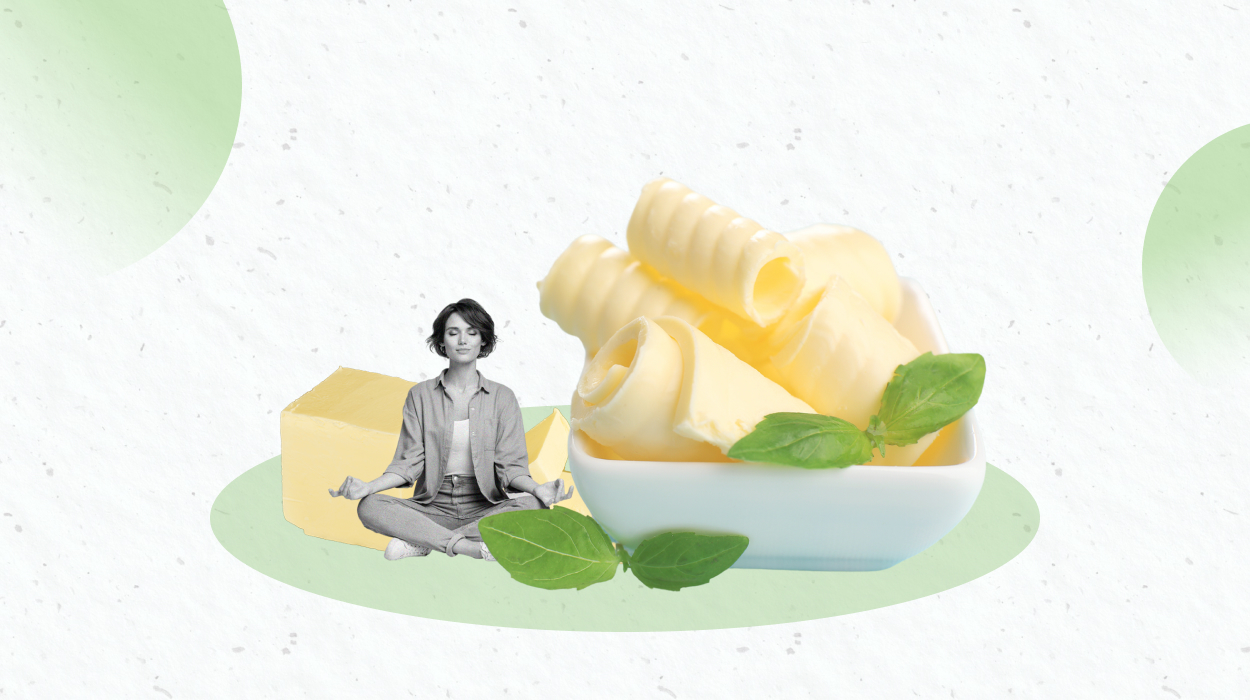 Evidence Based
Evidence Based
Evidence Based
This article is objectively based on relevant scientific literature, written by experienced medical writers, and fact-checked by a team of degreed medical experts.
Our team of registered dietitian nutritionists and licensed medical professionals seek to remain objective and unbiased while preserving the integrity of any scientific debate.
The articles contain evidence-based references from approved scientific sites. The numbers* in parentheses (*1,2,3) will take you to clickable links to our reputable sources.
Is Margarine Vegan? Can Vegans Eat This Spread In 2024?

Following a vegan diet can be a minefield, particularly if you are new to it. We already know you cannot eat meat, eggs, or dairy, and your diet will heavily focus on fruits and veggies. However, even some foods that are supposed to be plant-based are often not. Margarine is occasionally of the vegan food.
Is margarine vegan? The answer to this question depends on the type of margarine you are looking at. Let’s take a look at whether or not your favorite spread contains sneaky animal ingredients!
Can Vegans Eat Margarine
Yes, vegans can consume margarine, providing that they select a brand that is certified vegan or does not contain any animal-derived ingredients.
Is Margarine Vegan Friendly?
Some margarines are vegan food, and some are not. It depends on the ingredients used. Some margarines may also have milk fat that was extracted from cow’s milk.
To ensure margarine is vegan-friendly, look for one labeled vegan or check the ingredient list to ensure it does not contain animal-derived ingredients.
Additionally, be aware that some kinds of margarine may be processed with animal products or on equipment used for non-vegan foods. In this case, check the product packaging to see if it has a suitable vegan label.
What Is Margarine?
Since butter is traditionally made from animal fat or milk, margarine is a butter substitute made from vegetable oils and other ingredients. It was developed as an affordable and dairy-free alternative to butter.[1] Margarine has since become a popular substitute for butter. It is favored by people on plant-based diets like veganism or those avoiding the saturated fat in butter.
Margarine is made by blending vegetable oils with water and emulsifiers. The mixture is then churned to create a semi-solid product that resembles butter. It usually contains hardened or hydrogenated fat to make margarine spreadable straight from the refrigerator.
What Are The Ingredients In Margarine
The primary ingredients in margarine are vegetable oils such as palm, canola, and soybean oil. These are usually hydrogenated to keep the margarine solid at room temperature. In addition, margarine often contains emulsifiers and preservatives to prevent spoilage. It may contain artificial sweeteners or flavors for taste and coloring agents for appeal. This means margarine is not necessarily part of a healthy diet.
Margarines are refined products often containing fewer vitamins and minerals than unrefined plant fat sources, such as avocado or olive oil. Some are produced through hydrogenation, a process that creates harmful trans fats. This modification is believed to contribute to several health problems[2].
Trans fats[3] are associated with a risk of heart disease, neurodegenerative disorders, and premature death. Due to these health risks, the United States has imposed restrictions or bans[4] on the use of artificial trans fats. However, trace amounts might still be present.[5]
Vegan Margarine: Ingredients To Avoid
Some non-vegan margarine ingredients are lactic acid, buttermilk, whey, casein, and vitamin D3.[6] Lactic acid is derived from milk, while whey and casein are dairy proteins. Vitamin D3 can be sourced from animal products like sheep’s wool or fish liver oils.
Check the vegan margarine’s label to ensure they don’t contain specific ingredients derived from animals, such as:
Animal fats
Historically, margarine was manufactured using animal fats from various sources like beef tallow. Some brands might still use this, but any margarine containing animal fats is unsuitable for vegans.
Casein
Casein is another by-product of cheese production. Specifically, it’s the leftover curd when milk is coagulated. This dairy-derived ingredient is not suitable for vegans.
Avoid Lactose in Vegan Margarine
Lactose is a type of sugar naturally found in milk and dairy products. It’s unsuitable for a vegan diet as a dairy product, meaning it should not be included in vegan margarine.
Lecithin
Lecithin is a fatty substance derived from animal tissues or egg yolks, although plant-based sources are also available. Vegan margarine should only contain lecithin from plant sources not from animal fat.
Marine oil
Derived from fish or other aquatic animals, it is occasionally used in margarine, particularly those resembling shortening. As it’s animal-derived, it’s not vegan-friendly.
Avoid Suet In Vegan Margarine
A hard type of fat found around the loins or kidneys of animals, suet is sometimes used in margarine production. Given its animal origin, it’s not appropriate for vegan margarine.
Tallow
This type of fat, derived from cattle or sheep, is often used to manufacture various food items, including margarine. Because of its animal origin, it’s unsuitable for vegan margarine.
Vitamin D3
Often derived from lanolin, a product from sheep’s wool, Vitamin D3 is commonly found in many food items. However, its animal origin makes it unacceptable in vegan products.
Avoid Whey In Vegan Margarine
Whey is the watery part that separates from milk during cheese production. It’s an animal by-product and should not be present in vegan margarine.
Vegan Margarine Is One Of Margarine Alternatives
There are various vegan and non-vegan alternatives to margarine, depending on your use. They include:
- Butter: Traditional butter is a non-vegan alternative to margarine and can be used in baking, cooking, and as a spread. It gives food a rich, creamy flavor.
- Olive Oil or Avocado Oil: Both vegan, they are Ideal for sautéing and making salad dressings. It’s also a healthier option due to its high unsaturated fat content.
- Coconut Oil: Vegan is great for baking and frying due to its high smoke point. It also adds a hint of tropical flavor to dishes.
- Avocado: Vegan, fondly known as nature’s butter, can be mashed and used as a spread on toast or sandwiches or in a green smoothie! It’s loaded with healthy fats and fiber.
- Ghee: Sometimes used as a butter substitute, it has a higher smoke point than regular butter, making it suitable for frying and sautéing. It also has a nutty flavor that adds depth to dishes. But it is not vegan.
- Vegan Butter: Vegan butter is a dairy-free alternative to butter, made from various plant-based ingredients, and they are often whole food-based rather than refined.
- Almond Butter: Like peanut butter, almond butter can be used as a spread or in baking. It’s a good protein and healthy fat source and can often be found in vegan meal replacement bars.
- Yogurt: This can replace margarine or butter in baking to give a moist texture. It’s also a great source of probiotics. However, it must be specifically labeled as vegan yogurt.
- Applesauce: A healthier vegan alternative to baking, applesauce provides moisture and sweetness, allowing you to reduce the amount of sugar in recipes.
- Tahini: A key ingredient in hummus, tahini can also be used in dressings, sauces, and baking. It’s a great vegan source of calcium and plant-based protein.
The Bottom Line
If you are on a vegan diet, it is best to check the packaging of your margarine for a certified vegan sticker or label to ensure that it is made with entirely plant-based ingredients and not any animal derivatives. Now you can know “Can Vegans Eat Margarine”.
Alternatively, you could spread your wings next time you spread your vegan margarine and opt for one of the many other alternatives, such as avocado. Don’t have time for all of that? Then utilizing a vegan meal delivery service can save you a lot of hassle.
Frequently Asked Questions
Vegan margarine is made from plant-based oils, such as soybean, canola, or olive oil. To ensure your margarine is vegan, check for a certified vegan label.
No. Just because it’s called margarine does not guarantee it’s vegan.
Some stick margarines are vegan. Again, check for a certified vegan label to ensure it is made from plant-based oils.
+ 6 sources
Health Canal avoids using tertiary references. We have strict sourcing guidelines and rely on peer-reviewed studies, academic researches from medical associations and institutions. To ensure the accuracy of articles in Health Canal, you can read more about the editorial process here
- Rajah, K.K. (2014). Spreadable products. [online] pp.213–252. doi:https://doi.org/10.1002/9781118788745.ch6.
- Thaís Santos Silva, Barrera-Arellano, D. and Ana C.F. Ribeiro (2021). Margarines: Historical approach, technological aspects, nutritional profile, and global trends. [online] 147, pp.110486–110486. doi:https://doi.org/10.1016/j.foodres.2021.110486.
- Ginter, E.K. and Simko, V. (2016). New data on harmful effects of trans-fatty acids. [online] 117(05), pp.251–253. doi:https://doi.org/10.4149/bll_2016_048.
- Amico, A., Wootan, M.G., Jacobson, M.J., Leung, C.W. and And Walter Willett (2021). The Demise of Artificial Trans Fat: A History of a Public Health Achievement. [online] 99(3), pp.746–770. doi:https://doi.org/10.1111/1468-0009.12515.
- Dorni, C., Anil Panghal, Gunendra Saikia and T. Longvah (2018). Fatty acid profile of edible oils and fats consumed in India. [online] 238, pp.9–15. doi:https://doi.org/10.1016/j.foodchem.2017.05.072.
- Spiro, A. and Buttriss, J. (2014). Vitamin D : An overview of vitamin D status and intake in E urope. Nutrition Bulletin, [online] 39(4), pp.322–350. doi:https://doi.org/10.1111/nbu.12108.



